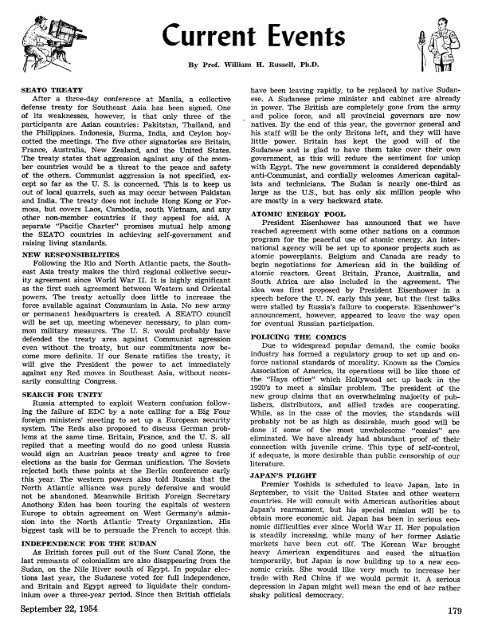Covenanter Witness Vol. 53 - Rparchives.org
Covenanter Witness Vol. 53 - Rparchives.org
Covenanter Witness Vol. 53 - Rparchives.org
You also want an ePaper? Increase the reach of your titles
YUMPU automatically turns print PDFs into web optimized ePapers that Google loves.
ministers'office"Current EventsBy Prof. William H. Russell, Ph.D.SEATO TREATYAfter a three-day conference at Manila, a collectivedefense treaty for Southeast Asia has been signed. Oneof its weaknesses, however, is that only three of theparticipants are Asian countries: Pakitstan, Thailand, andthe Philippines. Indonesia, Burma, India, and Ceylon boycotted the meetings. The five other signatories are Britain,France, Australia, New Zealand, and the United States.The treaty states that aggression against any of the member countries would be a threat to the peace and safetyof the others. Communist aggression is not specified, except so far as the U. S. is concerned. This is to keep usout of local quarrels, such as may occur between Pakistanand India. The treaty does not include Hong Kong or Formosa, but covers Laos, Cambodia, south Vietnam, and anyother non-member countries if they appeal for aid. Aseparate "Pacific Charter" promises mutual help amongthe SEATOraising living standards.countries in achieving self-government andNEW RESPONSIBILITIESFollowing the Rio and North Atlantic pacts, the Southeast Asia treaty makes the third regional collective security agreement since World War II. It is highly significantas the first such agreement between Western and Orientalpowers. The treaty actually does little to increase theforce available against Communism in Asia. No new armyor permanent headquarters is created. A SEATO councilwill be set up, meeting whenever necessary, to plan common military measures. The U. S. would probably havedefended the treatyarea against Communist agressioneven without the treaty, but our commitments now become more definite. If our Senate ratifies the treaty, itwill give the President the power to act immediatelyagainst any Red moves in Southeast Asia, without necessarily consulting Congress.SEARCH FOR UNITYRussia attempted to exploit Western confusion following the failure of EDC by a note calling for a Big Fourforeign meeting to set up a European securitysystem. The Reds also proposed to discuss German problems at the same time. Britain, France, and the U. S. allreplied that a meetingwould do no good unless Russiawould sign an Austrian peace treaty and agree to freeelections as the basis for German unification. The Sovietsrejected both these points at the Berlin conference earlythis year. The western powers also told Russia that theNorth Atlantic alliance was purely defensive and wouldnot be abandoned. Meanwhile British Foreign SecretaryAnothony Eden has been touring the capitals of westernEurope to obtain agreement on West Germany's admission into the North Atlantic Treaty Organization.Hisbiggest task will be to persuade the French to accept this.INDEPENDENCE FOR THE SUDANAs British forces pull out of the Suez Canal Zone, thelast remnants of colonialism are also disappearing from theSudan, on the Nile River south of Egypt. In popular elections last year, the Sudanese voted for full independence,and Britain and Egypt agreed to liquidate their condominium over a three-year period. Since then British officialsSeptember 22, 1954have been leaving rapidly, to be replaced bynative Sudanese. A Sudanese prime minister and cabinet are alreadyin power. The British are completely gone from the armyand police force,and all provincial governors are nownatives. By the end of this year, the governor general andhis staff will be the only Britons left, and they will havelittle power. Britain has kept the good will of theSudanese and is glad to have them take over their owngovernment, as this will reduce the sentiment for unionwith Egypt. The new government is considered dependablyanti-Communist, and cordially welcomes American capitalists and technicians. The Sudan is nearly one-third aslarge as the U.S., but has onlyare mostly in a very backward state.ATOMIC ENERGY POOL.six million people whoPresident Eisenhower has announced that we havereached agreement with some other nations on a commonprogram for the peaceful use of atomic energy. An international agency will be set up to sponsor projects such asatomic powerplants. Belgium and Canada are ready tobegin negotiations for American aid in the building ofatomic reactors. Great Britain, France, Australia, andSouth Africa are also included in the agreement. Theidea was first proposed by President Eisenhower in aspeech before the U. N. early this year, but the first talkswere stalled by Russia's failure to cooperate. Eisenhower"sannouncement, however, appeared to leave the way openfor eventual Russian participation.POLICING THE COMICSDue to widespread popular demand, the comic booksindustry has formed a regulatory group to set up and enforce national standards of morality. Known as the ComicsAssociation of America, its operations will be like those ofthe "Hayswhich Hollywood set up back in the1920's to meet a similar problem. The president of thenew group claims that an overwhelming majorityof publishers, distributors, and allied trades are cooperating.While, as in the case of the movies, the standards willprobably not be as high as desirable, much good will bedone if some of the most unwholesome "comics" areeliminated. We have already had abundant proof of theirconnection with juvenile crime. This type of self-control,if adequate, is more desirable than public censorship of ourliterature.JAPAN'S PLIGHTPremier Yoshida is scheduled to leave Japan, late inSeptember, to visit the United States and other westerncountries. He will consult with American authorities aboutJapan's rearmament, but his special mission will be toobtain more economic aid. Japan has been in serious economic difficulties ever since World War II. Her populationis steadily increasing, while many of her former Asiaticmarkets have been cut off. The Korean War broughtheavy American expenditures and eased the situationtemporarily, but Japan is now building up to a new economic crisis. She would like very much to increase hertrade with Red China if we would permit it. A seriousdepression in Japan might well mean the end of her rathershaky political democracy.179
















